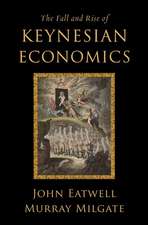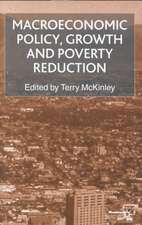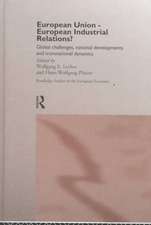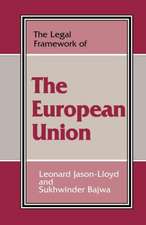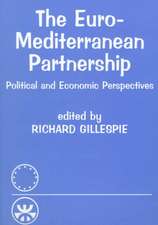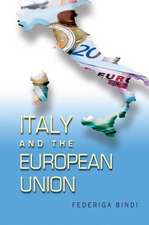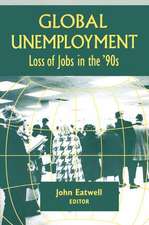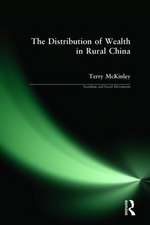Challenges for Europe in the World, 2030
Autor John Eatwell, Terry McKinleyen Limba Engleză Paperback – 20 mai 2014
| Toate formatele și edițiile | Preț | Express |
|---|---|---|
| Paperback (1) | 320.96 lei 6-8 săpt. | |
| Taylor & Francis – 20 mai 2014 | 320.96 lei 6-8 săpt. | |
| Hardback (1) | 773.99 lei 6-8 săpt. | |
| Taylor & Francis – 20 mai 2014 | 773.99 lei 6-8 săpt. |
Preț: 320.96 lei
Preț vechi: 360.95 lei
-11% Nou
Puncte Express: 481
Preț estimativ în valută:
61.42€ • 65.67$ • 51.21£
61.42€ • 65.67$ • 51.21£
Carte tipărită la comandă
Livrare economică 18 aprilie-02 mai
Preluare comenzi: 021 569.72.76
Specificații
ISBN-13: 9781472419262
ISBN-10: 147241926X
Pagini: 408
Ilustrații: Includes 103 b&w illustrations
Dimensiuni: 174 x 246 x 26 mm
Greutate: 0.86 kg
Ediția:New ed
Editura: Taylor & Francis
Colecția Routledge
Locul publicării:Oxford, United Kingdom
ISBN-10: 147241926X
Pagini: 408
Ilustrații: Includes 103 b&w illustrations
Dimensiuni: 174 x 246 x 26 mm
Greutate: 0.86 kg
Ediția:New ed
Editura: Taylor & Francis
Colecția Routledge
Locul publicării:Oxford, United Kingdom
Notă biografică
John Eatwell, House of Lords and Queens College Cambridge, UK, Terry McKinley, University of London, UK and Pascal Petit, University of Paris 13, France.
Recenzii
’Offers a chilling analysis of the economic dimension of Europe’s position in the world 2030. Takes a point of departure in the current economic crisis yet provides intriguing projections of what might or could happen to Europe’s global ranking under the conditions of selected political choices.’ Knud Erik Jørgensen, Aarhus University, Denmark ’An indispensable text for anyone concerned with Europe's economic future.’ Anthony Giddens, former Director of London School of Economics, UK and Member of the House of Lords 'This excellent book will provide important and novel insights for students of global and European governance, scholars pursuing European integration studies and analysing the increasing gap between elites and the general public, scholars and policy makers focusing on the challenges ahead in such fields as financial regulation and macro-economic stability, demography, employment and migration, energy needs and climate change, health, social inclusion and income inequality.' European Review of International Studies 'The contributions in the book reflect profound expertise on the mechanisms of European governance and the specific policy challenges facing the European continent in the global context. The main contribution of this volume lies in the multiple future scenario analysis, which offers political elites in Europe crucial insights into the potential future development of economic and political integration. Here this book goes much further than most existing publications, which tend to be limited to the analysis of the post-crisis EU policy mechanisms and current short-term policy challenges. This a bold approach given that the future path of the European continent and the EU as its representative organisation has become more uncertain than ever.' Global Policy Journal
Cuprins
1: Executive Summary: Europe in the World, 2030; 2: Global and European Governance in a 2030 Perspective; 3: Macro-model Scenarios and Implications for European Policy; 4: Financial Markets and International Regulation; 5: Technology, Productivity and Trade: Europe in the Context of Regionalisation and Globalisation; 6: Energy, Environment and Sustainable Globalisation; 7: Development, Demography and Migrations; 8: Well-being in Europe and in the World to 2030; 9: The Political Economy of Change at a Time of Structural Crisis
Descriere
Challenges for Europe in the World, 2030 embodies critical thinking about the long-term implications for Europe of the clear shift of power from the West to the East and the South. Designed as a multi-faceted project, this book presents an integrated assessment covering a wide range of policy areas and alternative assumptions about trends in global and European governance. In order to reach this ambitious objective in a comprehensive and consistent way, several types of quantitative and qualitative approaches have been combined: a model of macro regions of the world economy, an institutional perspective, and lessons from foresight studies.

